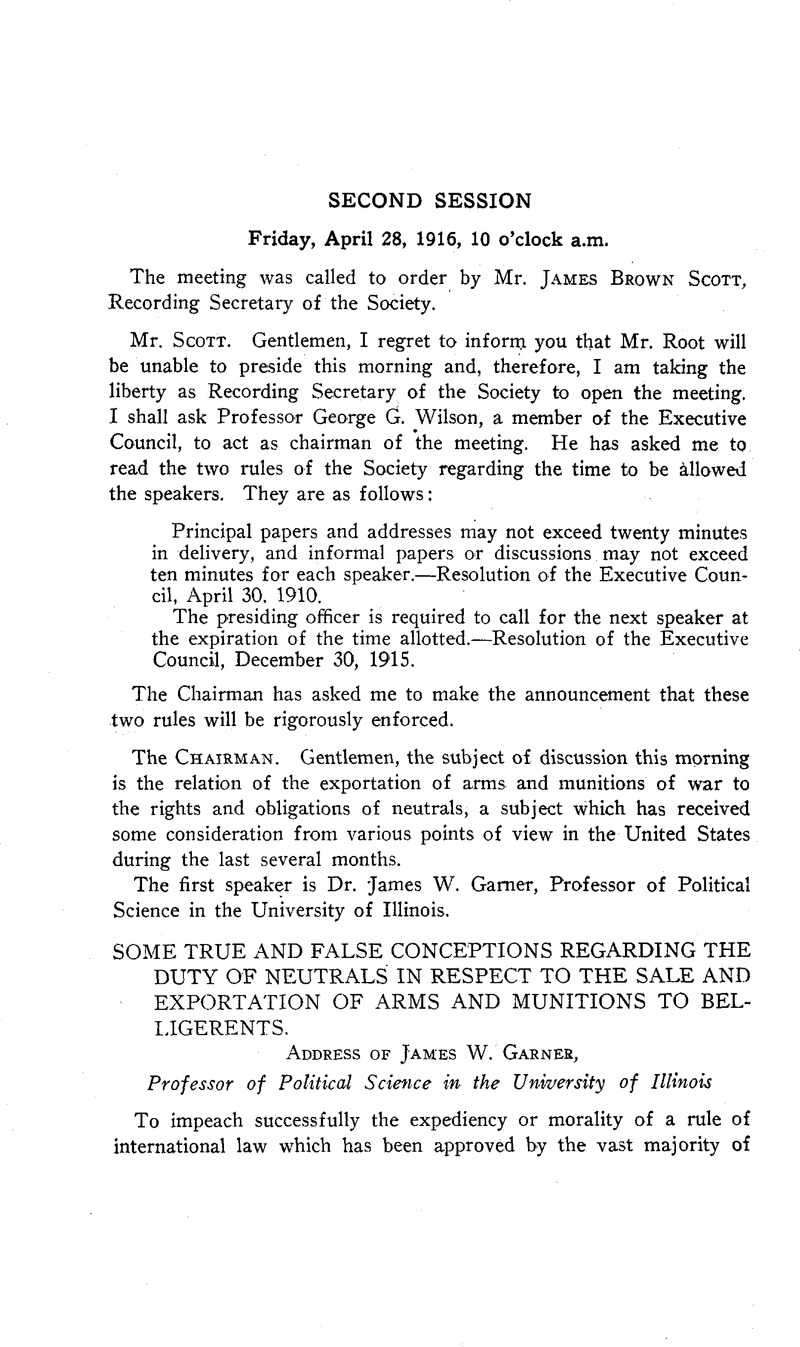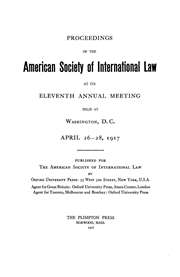No CrossRef data available.
Article contents
Some true and false conceptions regarding the duty of neutrals in respect to the sale and exportation of arms and munitions to belligerents
Published online by Cambridge University Press: 27 February 2017
Abstract

- Type
- Second Session
- Information
- Copyright
- Copyright © American Society of International Law 1916
References
1 ’International Law, p. 320.
2 Outlines of an International Code, sec. 946.
3 lnternational Law, Vol. III, sec. 230.
4 Droits et Devoirs des nations neutres en Temps de Guerre, tome II, p. 424.
5 Traite des Prises Maritimes, t. I, p. 394.
6 Lois et usages de la neutralite, t. I, sec. 93, also his Contrebande de Guerre,pp. 52, 67.
7 Le Droit des Neutres (Fr. trans.), p. 126.
8 Quoted by von Bar in the Revue de Droit International, Vol. XXVI (1894), p. 404.
9 Droit International Codifie (Ed. by Lardy), sec. 766.
10 Part III, sec. 3, par. b.
11 This has been shown by many writers, for example, by Geffcken, in Holtzen dorff’s Handbuch des Valkerrechts, Bd. IV, p. 690; von Bar, Revue de Droit International, Vol. 26, p. 401; Lawrence, Principles, p. 699; Oppenheim, Int. Law, Vol. II, p. 377; and Snow, International Law, p. 134.
12 Der Handel mit Waif en and Kriegsmaterial, in Holtzendorff’s Handbuch, Bd. IV, sec. 152.
13 See his article entitled Observations sur le contrebande de guerre in the Revue de Droit International et de Legislation compare, Vol. XXVI (1894), pp. 401
14 Le Droit des Neutres sur mer (French trans.), p. 126.
15 1n a recent petition addressed to the President and Congress alleged to have been signed by 1,000,000 American citizens, the statement was made that “on April 23, 1898, after the Spanish-American War had begun the British Government placed an embargo on munitions of war.” This statement, like many others made by the embargo propagandists in this country, is not true. The Queen’s neutrality proclamation of April 23, 1898, merely warned British subjects that if any of them committed certain acts, among which was the carrying of arms and munitions to either belligerent, their ships and goods would be liable to capture and confiscation. See the text in Proclamations and Decrees of Neutrality in the War with Spain, p. 35. The British proclamation did not prohibit such trade, and no penalties were prescribed for engaging in it. In fact, military supplies were purchased in Great Britain by both belligerents. Indeed, the English colony of Jamaica is said to have become the chief source of supply for the Spanish army in Cuba, and except for a mild protest from the American consul at Kingston, no complaint was made by the American Government. Benton, International Law and Diplomacy of the Spanish-American War, pp. 195–196.
16 See Earl Granville’s note of September 15, 1870, to Count Bernstorff, British and Foreign State Papers, Vol. 61, p. 761. “During the whole of the Crimean War,” says Earl Granville, “arms and other contraband were copiously supplied to Russia by the states of the Zollverein ; regular agents for traffic were established at Berlin, Magdeburg, Thorn, Konigsberg, Posen, Bromberg, and other places and no restraint was put upon their operations.”
17 See a letter of White, Andrew D., American Ambassador to Spain in 1898, to Blake, W. B., dated October 6, 1915, printed in the New York Times of January 29, 1916, and in the Fatherland of February 9, 1916. See also extracts from the diplomatic correspondence relating to the matter, in an article by Dennis, W. C., Esq., in the Annals of the American Academy of Political and Social Science, July, 1915, pp. 13–14, and the official statement of the Secretary of State published in the daily press of April 23, 1915.Google Scholar
18 Bluntschli, op. cit., sec. 766, and Rivier, Droit des Gens, Vol. II. p. 412. Rivier says all the states above mentioned issued such proclamations, but Kleen does not include Austria-Hungary, Denmark, Spain, Italy, or The Netherlands in the list which he gives. Lois et usages, I, 382, and Contrebande de Guerre, pp. 52, 68. Bonfils, secs. 1472 and 1474, mentions only Belgium, Switzerland, and The Netherlands.
19 Proclamations and Decrees During the War With Spain, pp. 13, 22, 61.
20 Ibid., p. 27.
21 See an article by Senor Da Gama, Brazilian Ambassador to the United States, in the Annals of the American Academy of Political and Social Science, July, 1915, pp. 147 ff.
22 See my article on Contraband, Right of Search and Continuous Voyage in the American Journal of International Law, April, 1915, p. 393.
23 Compare the remarks of Professor Moore, J. B. before the American Academy of Political and Social Science, Annals, July, 1915, p. 146, and the remarks of Dennis, W. C. Google Scholar,Esq., ibid., p. 178. In the German memorandum of April 4, 1915, it is virtually admitted that the embargoes laid by the neutral Powers of Europe were measures unconnected with neutrality but were rendered necessary by the duty of “perfecting their own armaments.”
24 Congressional Record, 64th Cong., 1st sess., p. 1797. Compare also the remarks of Senator Kenyon to the same effect, ibid., p. 1793; of Senator LaFollette, ibid.,,tp. 1800; of Senator Ashurst, ibid., p. 1796; of Senator Robinson, ibid., p. 1797; of Representative Ricketts, ibid., pp. 2657–2658; of Senator Hitchcock, ibid., 63rd Cong., 3rd sess., p. 3938; of Representative Porter, ibid., App., pp. 583 –585; of Representative Vollmer, ibid., App., pp. 735–736. See also a pamphlet entitled “Private Property and the Nation’s Honor,” by Aked and Rauschenbuch; Burgess, the European War, Ch. VII; an article by von Mach, “The German View Point,” Boston Transcript, April 14, 1915; and Butte, Proceedings of the American Society of International Law, 1915, p. 129.
25 Cong. Record, 63rd Cong., 3rd sess., p. 3938.
26 Compare on this point the remarks of Professor Woolsey, T. S. Google Scholar, in an article entitled “Case for the Munitions Trade,” Leslie’s Weekly, July 29, 1915.
27 Collected Papers of John Westlake, pp. 379–380.
28 8ritish and Foreign State Papers, Vol. 61, p. 765.
29 These views of von Bar are set forth in an article entitled Observations sur le Contrebande de Guerre, published in the Revue de Droit International et de Législation Comparée, Vol. XXVI (1894), pp. 401 ff.
30 British and Foreign State Papers, Vol. 61, p. 764. Compare the following remarks of the late Professor Goldwin, Smith in a letter to Professor Muller, Maxof Oxford : “It would be too much to expect that whenever two nations chose to disturb the peace of the world, all the other nations should be required to prohibit lawful trading, and to turn their governments into detectives armed, as they must be for such a purpose, with arbitrary powers. You can not draw any real distinction between arms and other things needed by belligerents. One belligerent needs rifles, another saddlery, a third cloth for uniforms, a fourth biscuit, a fifth copper or iron.” Goldwin, Smith Google Scholar’s Correspondence, ed. by Haustain, p. 35, quoted in an editorial in the American Journal of International Law, October,1915, p.930.
31 Westlake remarks that if the exportation of contraband were prohibited, England would be the country in which with the best intentions and greatest activity on the part of the government, such a rule would be the worst observed and which would suffer most from international difficulties to which the breach of it would give rise. Collected Papers, p. 391. The Zulus, says Spaight (War Rights on Land, p. 478), who fought at Islandwana and Rorke’s Drift in 1879, were armed with rifles which had been smuggled into Zululand by English traders who knew perfectly well for what purpose the arms were to be used. Spaight also remarks that the sword bayonets for the French Chassepôts used in the Franco-German War of 1870, though sold at Birmingham, were first imported from Germany and thus employed to kill Germans
32 War Rights on Land, p. 475.
33 Der Handel mit Waif en and Kriegskonterbande, in Holtzendorff, Handbuch, Bd. IV, sec. 152.
34 Observations sur le contrebande de Guerre, Revue de Droit International et de Leg. Comp., Vol. XXVI (1894), p. 401.
35 The proposal to prohibit trade in contraband has also been criticized on the above mentioned grounds by Creasy, First Platform of International Law, p. 608; by Calvo, Droit Int. Pub., Vol. V, sec. 2774; by Sir William Vernon Harcourt, Letters of Historicus; by Davis, Elements of International Law, p. 403; by Lawrence, Principles, p. 702 (who remarks that the effective enforcement of such a policy would require an army of spies and informers) ; and by many jurists at various sessions of the Institute of International Law, notably by Westlake and Lorimer at the meeting of 1875 (Rev. de Droit International, Vol. VII, pp. 605, ff) and by General den Beer Portugael and M Lardy in 1894 (ibid., Vol. XXVI, pp. 323 ff.
36 Principles of International Law, 4th ed., p. 702.
37 Revue de Droit International, etc., Vol. VII (1875), p. 609. In this connection it may be remarked that the ground upon which Great Britain remonstrated against the transit of arms through Prussia to Russia during the Crimean War was not that Prussia was bound to prohibit such traffic, but that having issued a decree for that purpose she was bound to enforce it. See Earl Granville’s note of September 30, 1870, to Count Bernstorff, British and Foreign State Papers, Vol. 61, p. 762.
38 Compare the remarks of Dennis, William C. Google Scholar , Esq., in the Annals of the American Academy of Political and Social Science, July, 1915, p. 173.
39 This danger is emphasized by Secretary Lansing in his note of June 29, 1915, to the Austro-Hungarian Government.
40 Cofleeted Papers, pp. 391–392. Compare also the remarks of Dennis, Wm. C. , Esq., in the Annals of the American Academy of Political and Social Science, July, 1915, p. 175, and a letter of ex-president Taft of January 24, 1916, to Mach, E. Von Google Scholar . Dr. C. N. Gregory, in a recent article published in the Outlook (1915, p. 520), calls attention to a report that at the outbreak of the present European War an important European Power found on taking account of its stock that it had only six rounds of ammunition per capita for its armed forces. Had it been compelled to enter the war and had it been deprived of purchasing ammunition in foreign markets, its plight would have been pitiable.




